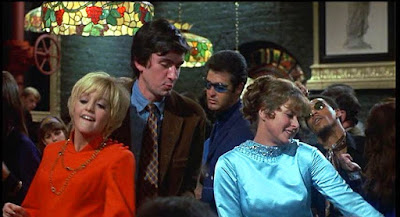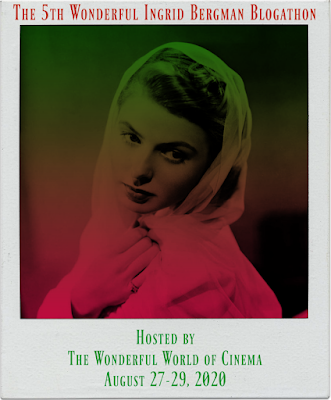O filme “Flor
de Cacto” começa com uma música de Quincy Jones cuja letra diz “primavera é
apenas um estado de espírito”. Para a protagonista, é verdade: ela floresce,
deixando de lado uma personalidade considerada fria e desinteressante. “Flor de
Cacto” é, por causa disso, um filme sobre se libertar – e, numa surpresa
agradável, quem se liberta é uma mulher madura, algo que não teria espaço nas
telas 10 anos antes.
The film
“Cactus Flower” starts with a song by Quincy Jones that says “Spring is just a
state of mind”. For the female lead, it really is: she blossoms leaving behind
a personality seen as icy cold and uninteresting. “Cactus Flower” is, because
of this, a film about becoming free – and, a thankful surprise, the one
becoming free is a mature woman, something that wouldn’t be on screen 10 years
before.
Toni Simmons (Goldie Hawn) está
prestes a cometer suicídio. O homem que ela ama, o dentista Julian Winston
(Walter Matthau), é casado e ela sabe disso. Na verdade, foi a honestidade
dele, ao contar que é casado e pai de três filhos, que a atraiu. Eles começam a
sair e tudo parece estar indo bem. Entretanto, no primeiro aniversário do dia
em que se conheceram, ele cancela o encontro. Ela decide se matar, mas o
vizinho Igor (Rick Lenz) a salva antes que ela se envenene com gás.
Toni
Simmons (Goldie Hawn) is about to commit suicide. The man she loves, the
dentist Julian Winston (Walter Matthau), is a married man and she knows it.
Actually, it was his honesty about being married and the father of three kids
that attracted her to him. They start going out and everything seems swell.
However, on the first anniversary of their meeting, he cancels their date. She
decides to kill herself, but her neighbor Igor (Rick Lenz) saves her before she
suffocates on gas.
O grande problema é que Julian não
é casado, nem mesmo tem filhos. Ele disse isso a Toni porque queria que as
coisas permanecessem casuais entre eles. Quando ele descobre que ela quase se
matou, ele promete se casar com ela para compensar o ato. Mas ainda há a
mentira: ele não tinha esposa e três filhos? Ele diz que está se divorciando,
mas Toni insiste em conhecer a esposa para garantir que ela ficará bem após o
divórcio. Julian então pede a sua enfermeira, Stephanie Dickinson (Ingrid
Bergman), para fingir que é sua futura ex-esposa. Como ela sempre cuidou dele,
ela aceita – e este é só o começo dos problemas e mais mentiras.
The biggest
issue is that Julian is not married, nor has kids. He told Toni that because he
wanted things to remain casual between them. When he learns that she almost
killed herself, he promises to marry her to compensate. But there is still the
lie: didn't he have a wife and three kids? He says he's divorcing his wife, but
Toni insists about meeting her to make sure she'll be fine after the divorce.
Julian then asks his nurse, Stephanie Dickinson (Ingrid Bergman), to pretend
she's his soon-to-be ex-wife. As she has always taken care of him, she does
that – and this is just the beginning of their troubles and more lies.
Não pude deixar de lembrar-me de
outro filme de Ingrid Bergman no qual o protagonista mente sobre ser casado: a
deliciosa comédia “Indiscreta” (1958). Neste filme, Philip Adams (Cary Grant)
diz a Anna Kalman (Ingrid) que é casado porque ele prefere não estragar uma
relação com a possibilidade de um futuro casamento. Aqui, entretanto, Ingrid
Bergman interpreta a amante, não outra mulher envolvida no esquema – talvez uma
prova de que, 11 anos depois, seu status como atriz havia mudado por causa da
idade?
I couldn't
help but remember another Ingrid Bergman film in which the leading man lies
about being married: the delightful comedy “Indiscreet”, from 1958. In this
film, Philip Adams (Cary Grant) tells Anna Kalman (Ingrid) that he's married because
he prefers not to spoil a relationship if the possibility of marriage is on the
horizon. Here, however, Ingrid Bergman plays the lover, not another woman
involved in the scheme – maybe a proof that, 11 years later, her status as an
actress had changed because of her age?
Há uma cena de dança icônica e
muito divertida envolvendo Cary Grant e uma coreografia maluca em “Indiscreta”.
Em “Flor de Cacto” temos uma sequência de dança hilária com Ingrid Bergman,
quando Stephanie desabrocha tal qual seu cacto, indo de espinhosa e pouco
atraente planta do deserto a uma mulher exuberante e amante da diversão. Não,
não, a idade não desacelerou Ingrid Bergman nem a fez ficar irrelevante: aqui
ela está roubando a cena!
There is an
iconic and very funny dancing scene involving Cary Grant and some crazy steps
in “Indiscreet”. In “Cactus Flower” we have a hilarious dancing sequence with
Ingrid Bergman, as Stephanie blossoms like her cactus, going from a prickly and
unattractive desert plant to an exuberant and fun-loving woman. No, no, age
hasn't slowed down Ingrid Bergman nor made her irrelevant: here she is
absolutely stealing the picture from everybody else!
Outro filme de Ingrid Bergman do
qual eu me lembrei foi “Mais Uma Vez Adeus” (1961), também sobre relacionamentos
modernos. Neste filme, Ingrid interpreta Paula, que tem um relacionamento
aberto com Roger (Yves Montand), mas se apaixona pelo jovem Philip (Anthony
Perkins). Quando Roger exprime que desaprova o romance de Paula com um homem
mais jovem, ela comenta que ele tem affairs com mulheres mais jovens, e ele
responde que isso é normal para os homens. O mesmo acontece em “Flor de Cacto”:
Julian acha estranho que Stephanie dance com Igor, mas para ele é perfeitamente
normal namorar Toni, que tem apenas 21 anos.
Another Ingrid Bergman movie that came to my mind was “Goodbye Again” (1961), also about modern relationships. In this film, Ingrid plays Paula, who has an open relationship with Roger (Yves Montand), but falls in love with the young Philip (Anthony Perkins). When Roger expresses disapproval of Paula's romance with a younger man, she calls him out for having affairs with younger women, to which he replies that it's something normal for men. The same happens in “Cactus Flower”: Julian thinks it's odd when Stephanie dances with Igor, but for him it's perfectly normal to date Toni, who is just 21.
O roteiro foi escrito por I.A.L
Diamond, colaborador constante de Billy Wilder. Neste filme, Diamond consegue
inserir mais piadas de teor sexual do que ele conseguia com Wilder, nos filmes
da dupla feitos durante o domínio restritivo do Código Hays. Em “Flor de
Cacto”, por exemplo, temos Julian dizendo que seu filho mais velho tem 12 anos,
mesmo ele sendo casado há apenas 10 anos, porque foi um bebê prematuro, e
também Igor, tristonho, dizendo que sua mãe deveria ter tomado a pílula.
The screenplay was written by I.A.L. Diamond, a constant Billy Wilder collaborator. In this film, Diamond manages to squeeze a few more sex jokes than he could do with Wilder, in their films made during the strict Code dominion. In “Cactus Flower”, for instance, we have Julian saying that his older son is 12, even though he has been married for only 10 years, because he was a premature baby, and also Igor, in a sad mood, saying that his mother should have taken the pill.
“Flor de Cacto” foi originalmente
uma peça da Broadway que revitalizou a carreira de Lauren Bacall. Ansiosa para
voltar a Hollywood, ela ficou um bocado chateada quando Ingrid Bergman foi
escolhida para interpretar Stephanie. Conhecendo Bacall de comédias como “Como
Agarrar um Milionário” (1953), podemos imaginar que sua performance como
Stephanie seria tão boa no filme quanto foi nos palcos, onde recebeu grandes
elogios.
“Cactus Flower” was originally a Broadway play that revitalized Lauren Bacall's career. Anxious to make a comeback in Hollywood, she was a bit disappointed when Ingrid Bergman was cast as Stephanie. Knowing Bacall in comedies like “How to Marry a Millionaire” (1953), we can imagine that her performance as Stephanie would be as great on screen as it was on stage, where she received fantastic reviews.
Goldie Hawn
– que nos créditos aparece como “apresentando”, mesmo já tendo feito outro
filme com seu nome verdadeiro, Goldie Jeanne Hawn – surpreendeu a todos quando
ganhou o Oscar de Melhor Atriz Coadjuvante por “Flor de Cacto” – a única
indicação do filme. Podemos discutir se Toni é protagonista ou coadjuvante, mas
não podemos negar que, com seus imensos olhos azuis, uma personalidade doce e
uma preocupação genuína com a personagem de Ingrid, Goldie interpreta uma
personagem adorável no filme.
Goldie Hawn – who receives an “introducing” credit even though she had already made a movie under her real name of Goldie Jeanne Hawn – surprised everybody when she won a Best Supporting Actress Oscar for “Cactus Flower” – the film’s only nomination. We could argue if Toni is a leading or a supporting character, but we can't deny that, with her huge blue eyes, a sweet personality and a sincere concern about Ingrid’s character, Goldie plays an adorable character in this film.
Embora
previsível, o filme é tão charmoso quanto outros dirigidos por Gene Saks, como
“Descalços no Parque” (1967) e “Um Estranho Casal” (1968). Há ainda um longo
caminho a ser percorrido até que atrizes maduras recebam papéis tão
interessantes quanto as mais jovens. Mas a mudança tinha de começar em algum
lugar, e “Flor de Cacto” é um bom ponto de partida para personagens femininas
mais livres e – por que não? – uma inspiração para que nós nunca nos esqueçamos
de nos divertir.
Although
predictable, this film is as charming as others directed by Gene Saks, like “Barefoot in the Park” (1967) and “The Odd Couple” (1968). There is still a long way
until mature actresses receive roles as interesting as the younger performers.
But change had to start somewhere, and “Cactus Flower” is a great starting
point for freer female characters and – why not? – an inspiration for us all to
never forget to have fun.
This is my
contribution to the 5th Wonderful Ingrid Bergman blogathon, hosted
by superfan Virginie at The Wonderful World of Cinema.













4 comments:
I really enjoyed your take on Cactus Flower. I haven't seen it in years and I think I will enjoy it more at this time of life than when I was younger.
This was a wonderful piece on a huge favourite of mine, Leticia. And I loved how you compared it with other Ingrid Bergman's films. Even tho I'm sure Lauren Bacall was great in the stage version, I'm kind of glad the role went to Ingrid because it gave her one of her very rare occasions to play comedy. And she was good at it!
Thank you so much for your contribution to the blogathon!
I love your take on this film and those references to other Bergman films. I always find it interesting to see who could have been cast in movies and it seems Bergman and Bacall had a lot of these. Thanks again.
This is the second review of Cactus Flower I've read, and I'm sold. Gonna have to see this one. :-)
Post a Comment